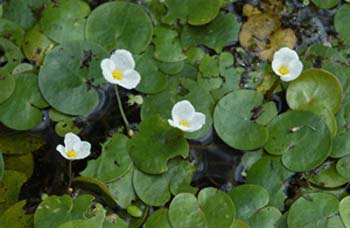It’s never too early to think spring no matter what the groundhog says!
Get ready for paddling and learn about invasive species identification and prevention.

The groundhog may have predicted six more weeks of winter but that doesn’t mean that it’s too early to start thinking about warmer temperatures and getting back on the water. Paddle sports are a great way to enjoy the wonderful outdoors that Michigan has to offer but it can also be a pathway for the spread of aquatic invasive species.
What is an aquatic invasive species?
Aquatic invasive species are plants, fish, snails, viruses, and other organisms that move into and colonize ecosystems where they don’t belong, usually damaging native species and water quality in the process.

Often, aquatic invaders are transported by humans — as live bait, planted in flower gardens, imported for fish ponds, carried in the bellies of shipping freighters — or plant material snagged on kayak rudders and stranded in puddles at the bottom of poorly drained canoes. If a non-native stowaway is still alive when the boat splashes into the next water body, the invader could find itself in fresh territory.
Free online program
The MI Paddle Stewards online program from Michigan Sea Grant and Michigan State University Extension will help paddlers learn about high-risk invasive species, how to properly clean a watercraft, and how to report invasive species using a free app. The MISIN (Midwest Invasive Species Information Network) app is a tool used by Michigan’s Department of Natural Resources and others to locate invasive species of concern. Using this app allows paddlers to help with the early detection of invasive species in their area.
Become an ambassador for Michigan waters in five short sessions (approximately 30-45 minutes needed to complete each session) and spread the word on invasive species to your friends and fellow paddlers. The MI Paddle Stewards course is free for all registrants. The course is designed to be self-paced so participants can stop the course and then pick-up where they left off when they log back in. Sign up now and complete the course any time before Dec. 31, 2022. Register for the class online.
Watch the video below to learn how to prevent the spread of invasive species with Michigan Sea Grant’s free online course.
Looking for new water trails?
Land Information Access Association, in partnership with Michigan Sea Grant and a variety of state agencies, local governments, and paddlers hosts a Michigan Water Trails website (www.michiganwatertrails.org), where users can find trail maps, safety information, and plenty of other paddling resources. The site catalogs more than 3,000 miles of trails across the state, from a loop around Isle Royale in northern Lake Superior to a Lake Erie trail that crosses the border into Ohio. Many trails move along or toward a lakeshore, while others are fully inland.
For questions and more information about either the MI Paddle Stewards online course or the Michigan Water Trails website, contact MSU Extension educator Mary Bohling (bohling@msu.edu). You can also receive regular updates on news about Michigan Water Trails through an MSU Extension news digest. Register online to sign up for the Water Trails digest.
Michigan Sea Grant helps to foster economic growth and protect Michigan’s coastal, Great Lakes resources through education, research and outreach. A collaborative effort of the University of Michigan and Michigan State University and its MSU Extension, Michigan Sea Grant is part of the NOAA-National Sea Grant network of 34 university-based programs.
The MI Paddle Stewards program was funded by the Michigan Invasive Species Grant program (www.michigan.gov/invasives). This article was prepared by Michigan Sea Grant under award NA180AR4170102 from the National Oceanic and Atmospheric Administration, U.S. Department of Commerce through the Regents of the University of Michigan. The statements, findings, conclusions, and recommendations are those of the author(s) and do not necessarily reflect the views of the National Oceanic and Atmospheric Administration, the Department of Commerce, or the Regents of the University of Michigan.



 Print
Print Email
Email

